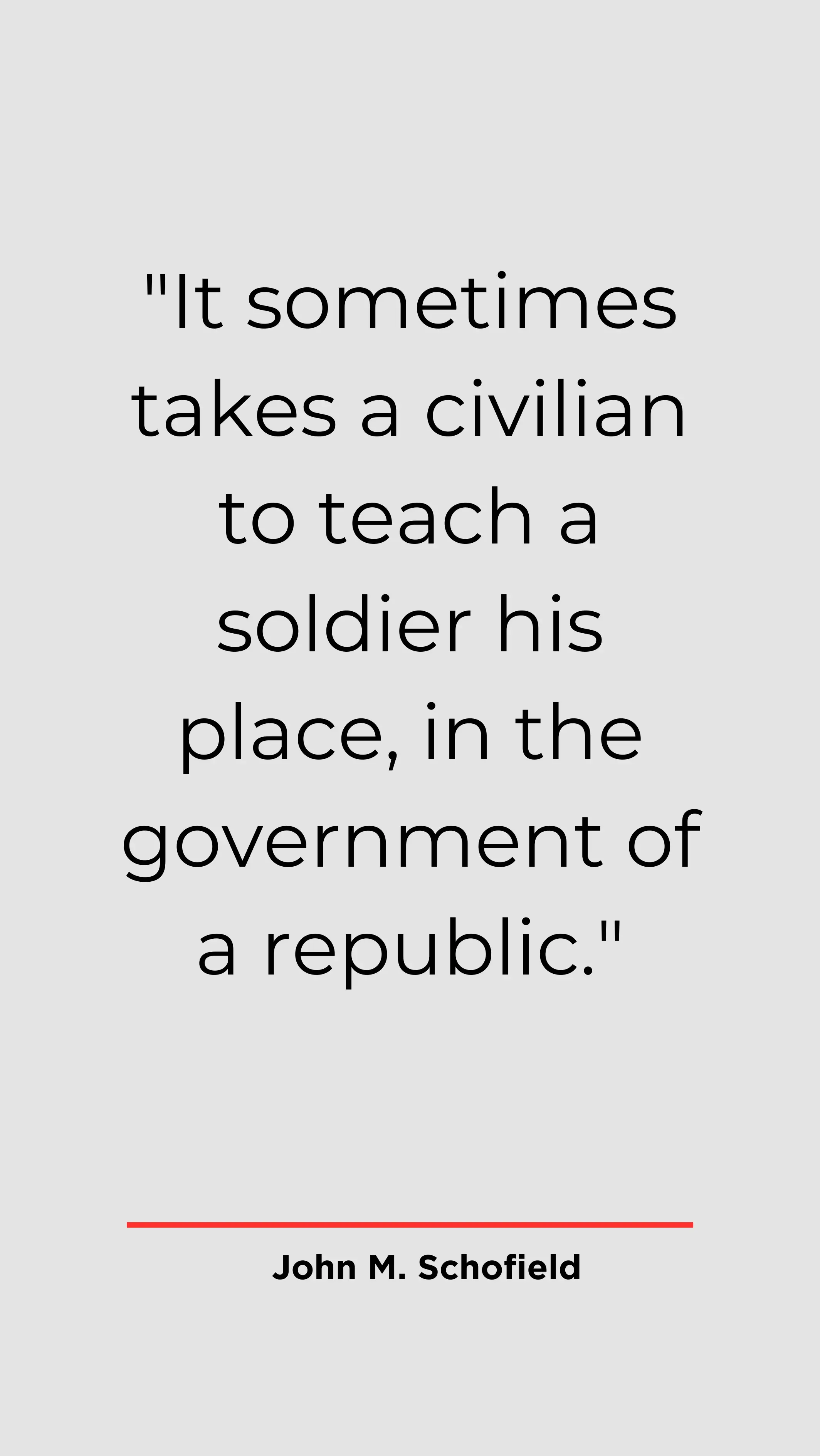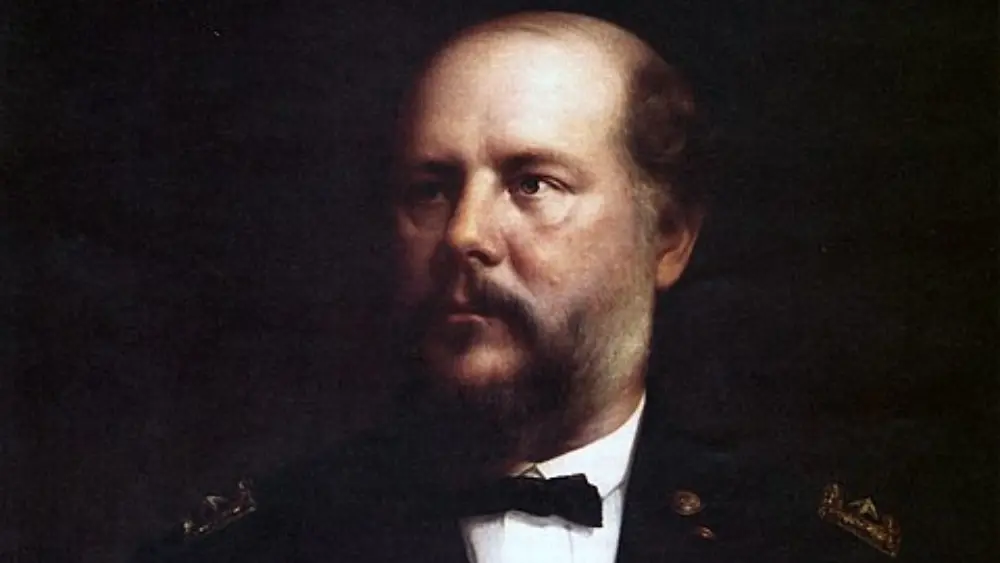John M. Schofield, born on September 29, 1831, in Gerry, New York, was a prominent American military officer whose contributions shaped the course of the Civil War and the Reconstruction Era that followed. Known for his strategic acumen, resourcefulness, and unwavering dedication to the Union cause, Schofield’s military career was marked by decisive action both on and off the battlefield. His leadership helped preserve the United States in its most trying moment and guided the nation through the turbulent years that followed the war’s end.
Early Life and Education
Schofield’s journey to prominence began in rural New York. His upbringing was modest, but he demonstrated an early aptitude for learning and leadership. In 1849, at just 18 years old, he received an appointment to the United States Military Academy at West Point, then widely regarded as the premier institution for developing military leaders.
Graduating in 1853, Schofield ranked seventh in a class of fifty-two cadets—a notable achievement that foreshadowed his future success. West Point instilled in him a foundation of discipline, technical expertise, and a sense of purpose. He was trained in engineering and artillery, fields that would prove invaluable during the Civil War. Schofield’s education imparted not only knowledge of tactics and military science but also a professional ethos rooted in duty, service, and honor.
This formative period forged the qualities that would define his leadership: intellectual rigor, adaptability, and a calm confidence in the face of adversity. The lessons and values he absorbed at West Point guided his conduct as he rose through the ranks to assume positions of ever-greater responsibility.
John M. Schofield: Civil War Service Begins
John M. Schofield’s early involvement in the American Civil War showcased his unwavering commitment to the Union cause. At the outbreak of the war in 1861, Schofield was stationed in Missouri, a state divided by loyalty to the Union and the Confederacy. Schofield, a staunch Unionist, became deeply involved in efforts to maintain control of Missouri and suppress Confederate sympathizers in the region. His dedication and effective leadership during this crucial period earned him recognition and trust among Union authorities.
Schofield’s pivotal role in Missouri eventually led to his appointment as a brigadier general. His ascent showcased both strategic acumen and unwavering loyalty to preserving the Union, a testament to his remarkable qualities. As the Civil War progressed, Schofield’s contributions would become increasingly significant, and his reputation as a capable military leader would continue to grow. This had a lasting impact on both the course of the conflict and the history of the United States.
Battle of Wilson’s Creek
Schofield’s first major test came in August 1861 at the Battle of Wilson’s Creek. Although officially serving as Chief of Staff to Brigadier General Nathaniel Lyon, Schofield’s influence on the conduct of Union forces was profound. The battle itself was fierce and chaotic, with Confederate forces under Generals Sterling Price and Ben McCulloch launching a determined assault to seize control of Missouri.
Despite being outnumbered, Union troops put up a resolute defense. Schofield’s steady hand contributed to their organization and fighting spirit. Although Lyon was killed in action and the Union forces ultimately withdrew, the battle demonstrated Schofield’s courage under fire and his skill in directing troops during critical engagements.
His conduct at Wilson’s Creek won admiration from peers and superiors alike. It was clear that Schofield possessed a combination of tactical clarity and moral resolve, qualities that were desperately needed as the conflict deepened.
John M. Schofield: Service in the West
Schofield’s career continued to ascend as he took on critical roles in the Western Theater. This region—stretching from the Mississippi River to the Appalachian foothills—was vital to Union strategy. Control of the West would sever Confederate supply lines and divide their territory.
During campaigns across Tennessee, Georgia, and beyond, Schofield distinguished himself in several engagements. At the Battle of Franklin in November 1864, he commanded forces that repelled a ferocious Confederate assault led by General John Bell Hood. Schofield’s timely decision to entrench his troops and hold firm under pressure saved the Union army from potentially catastrophic losses.
His leadership at Franklin, and previously at the Battle of Missionary Ridge, where Union forces broke through Confederate defenses outside Chattanooga, cemented his reputation as one of the Union’s most dependable commanders. He earned the respect of his soldiers, who valued his calm demeanor and keen eye for defensive positioning. Schofield proved time and again that he could be trusted to safeguard his forces while still achieving strategic objectives.
Appointment as Commander of the Department of Missouri
In 1863, Schofield was appointed commander of the Department of Missouri, a role that placed him at the helm of military and civil governance over a vast and volatile region. His responsibilities were immense: protect Union interests, suppress guerrilla warfare, and administer Reconstruction policies in a deeply divided society.
This appointment required more than battlefield prowess—it demanded diplomatic skill and political sensitivity. Schofield had to balance the enforcement of federal authority with efforts to reconcile former enemies and rebuild communities shattered by war. His leadership helped stabilize Missouri, demonstrating that he could guide not only soldiers but also civilians grappling with the conflict’s consequences.
John M. Schofield: Sherman’s March to the Sea
John M. Schofield’s contributions to the Union war effort extended far beyond the battlefield. One of his pivotal roles came during General William T. Sherman’s legendary March to the Sea in 1864. As the campaign unfolded, Schofield assumed a crucial role in coordinating logistics and supply lines to ensure that Sherman’s army received the essential provisions necessary for its progress through Georgia.
Moreover, Schofield’s logistical expertise and leadership were instrumental in the success of this audacious military campaign. The March to the Sea, which aimed to cut a swath of destruction through the Confederacy, required meticulous planning and execution to sustain the Union forces as they advanced deep into enemy territory. Schofield’s efforts in securing supplies and maintaining logistical support for Sherman’s army exemplified his dedication and resourcefulness. This contributed significantly to the campaign’s ultimate triumph and the Union’s progress towards victory in the Civil War. During this challenging campaign, his role in ensuring the well-being and effectiveness of Union forces was crucial. It underscored the importance of logistical expertise in successfully executing military strategies during this pivotal period in American history.
Post-Civil War Service and Reconstruction
When the war ended in 1865, Schofield’s commitment to his country did not waver. He transitioned to leadership roles that shaped the peace just as his earlier commands had shaped the war. Appointed Secretary of War by President Andrew Johnson in 1868, Schofield stepped into a fraught political climate. The nation was grappling with the monumental task of Reconstruction—restoring the Union, redefining civil rights, and rebuilding the South’s economy and infrastructure.
As Secretary of War, Schofield helped navigate conflicts between President Johnson and Congress over how Reconstruction should proceed. His steady hand contributed to maintaining order during this tense period. He also advocated for policies that protected the rights of newly freed African Americans, recognizing that the Union victory would be hollow without progress toward equality.
In later years, Schofield returned to active command and led the Army Division of the Pacific. He then served as Commanding General of the United States Army from 1888 until his retirement in 1895. He oversaw modernization initiatives and professional development programs. His efforts to standardize military training left a lasting imprint on the institution he had served since youth.

John M. Schofield: Legacy
John M. Schofield wove his legacy into the fabric of American history. His contributions during the Civil War were indispensable to the Union’s ultimate triumph. From the embattled fields of Missouri to the decisive confrontations in Tennessee, Schofield demonstrated the power of disciplined, adaptive leadership.
Beyond his battlefield achievements, Schofield’s work during Reconstruction stands as a testament to his broader vision of national unity and justice. He insisted that winning the war must lead to a commitment to peace founded on civil rights and reconciliation. In this, he mirrored the broader struggle of the era—a struggle to define what America would become after the searing ordeal of civil conflict.
Throughout his career, Schofield exemplified the principles of service and integrity. His life’s work reflected a profound belief in the ideals of democracy and a conviction that military power must always serve the greater good.
Even after retiring, Schofield remained engaged with military affairs and historical scholarship. His memoirs, Forty-Six Years in the Army, published in 1897, provided invaluable insights into the Civil War’s campaigns and the evolution of the American military.
John M. Schofield died on March 4, 1906, leaving behind a legacy of courage, wisdom, and unshakable dedication to the United States. His contributions remind us that the defense of freedom and the pursuit of justice require not only strength but also vision and compassion.
Conclusion
The story of John M. Schofield is a story of resilience and service. From a young cadet at West Point to a general shaping the destiny of a nation, he navigated the most crucial chapters in American history with steady purpose. His leadership on the battlefield, his work in Reconstruction, and his commitment to building a professional military force laid foundations that endure to this day.
Schofield’s life illustrates how one individual’s dedication can leave a profound impact, shaping not only the outcome of great conflicts but also the principles by which a nation defines itself. His example continues to inspire all who believe that honor, compassion, and courage are essential to preserving the values at the heart of American democracy.











